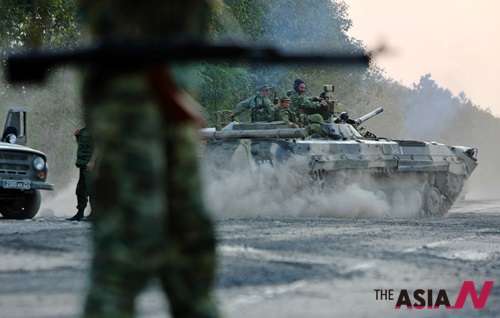Statement on the 6th anniversary of Russia-Georgia War

Russian troops leave their sentry post some 20 kilometers from Gori, Georgia, August 22, 2008. (Photo: Xinhua)
In this season of numerous Independence Day anniversaries, Georgia is reminded of the Russia-Georgia August 2008 War, which broke out 6 years ago on August 7. On this day, Russia invaded Georgia with a large-scale military operation and has since been occupying Georgia’s South Ossetia and Abkhazia regions, which makes up 20% of Georgia’s territory.
The signing of the Six-point Ceasefire Agreement on 12 August 2008, which stated that Russia should withdraw its forces to their pre-war positions, has not been upheld. On this anniversary occasion, the Ministry of Foreign Affairs of Georgia has released a statement to raise awareness about the conflict of Russian-Georgia 6 years ago, the unsolved situation, and its future goals to resolve the existing conflict through negotiations.
The statement says, “7 August 2014 marks the sixth anniversary of Russia’s aggression against Georgia and occupation of the territories of Georgia. As of 2014, Russia still has control over the Georgian regions of Abkhazia and Tskhinvali. These areas have turned into ‘the most inaccessible places on earth’, according to UN High Commissioner. As a consequence, fundamental rights of the local population are severely violated. Georgia government wants the de-escalation of relations with the Russian Federation and peaceful settlement of conflict, based on the fundamental principles of the international law.”
The full statement is provided below.
7 August 2014 marks the sixth anniversary of Russia’s aggression against Georgia and occupation of the territories of a sovereign, independent state. Six years after the August 2008 war, occupation forces still exercise effective control over the Georgian regions of Abkhazia and Tskhinvali. As a consequence, fundamental rights of the local population are severely violated and the hundreds of thousands of victims of the several waves of ethnic cleansing are deprived of the right to safe and dignified return to the places of their original residence.
Notwithstanding numerous calls from the international community, provisions of the Ceasefire Agreement of 12 August 2008 remain disregarded and unfulfilled. In full negligence of international obligations, barbwire fences and other artificial obstacles are being installed across the occupation line, which infringes civil, social and economic rights of local residents, primarily, their right to the freedom of movement.
Unfortunately, no progress has been achieved on important agenda items considered within the Geneva International Discussions, despite the efforts of Georgia and the Co-Chairs of the Discussions. The Russian Federation still refuses to adequately respond to the unilateral pledge on the non-use of force undertaken by Georgia in 2010 and later, reinforced with the Resolution of the Georgian Parliament on 7 March 2013. Attempts to establish international mechanisms in the occupied regions are openly opposed; as a result, these territories have turned into “black holes” and become “the most inaccessible places on earth”, as observed by the UN High Commissioner on Human Rights.
The Georgian side considers unacceptable to use the Geneva International Discussions as a tool for advancing one’s political goals through changing the format and agenda of the Discussions. Georgia highly values the firm position of the Co-Chairs on the absolute necessity to preserve the consensually agreed format and agenda of the Geneva International Discussions. Georgia is committed to further continue constructive engagement in the Discussions with the aim to resolve the outstanding political issues between Georgia and Russia, first and foremost, to guarantee the full implementation of the 12 August 2008 Ceasefire Agreement.
Six years after the August 2008 war, Georgia still strives for the de-escalation of relations with the Russian Federation and peaceful settlement of conflict, based on the fundamental principles of the international law. To this end, Georgia has undertaken a number of concrete, substantial steps, including the launch of unconditional dialogue on the resumption of trade, economic, cultural and humanitarian relations with Russia. Alongside with the phased normalization of relations with Russia, the European and Euro-Atlantic integration remains at a core of Georgian foreign policy. The government of Georgia spares no effort to fulfill the choice and aspiration of the Georgian people and to make substantial steps towards European and Euro-Atlantic integration. Signing of the Association Agreement as well as the DCFTA is the best testimony to this.
The Georgian Government stands strong in its belief that the development of a statehood based on the shared democratic values is the best and the most effective tool for the restoration of territorial integrity.
The Ministry of Foreign Affairs if Georgia would like to seize this opportunity and once again expresses its deepest sympathy to the families of the Georgian soldiers and civil population who fell a victim to the August 2008 War.
7 August 2014
George Khabelashvili
Minister-Counsellor
Embassy of Georgia to the Republic of Korea










































